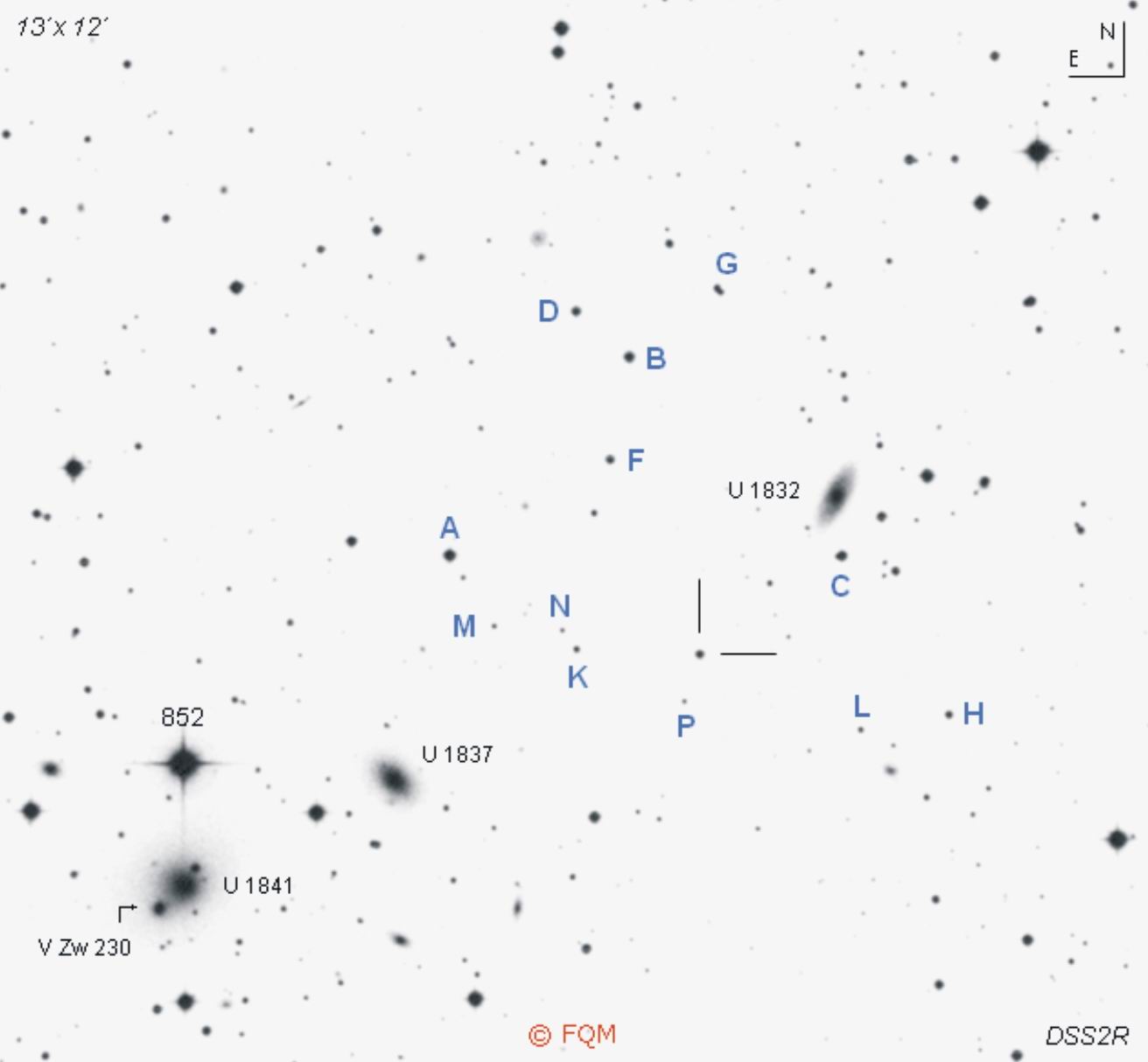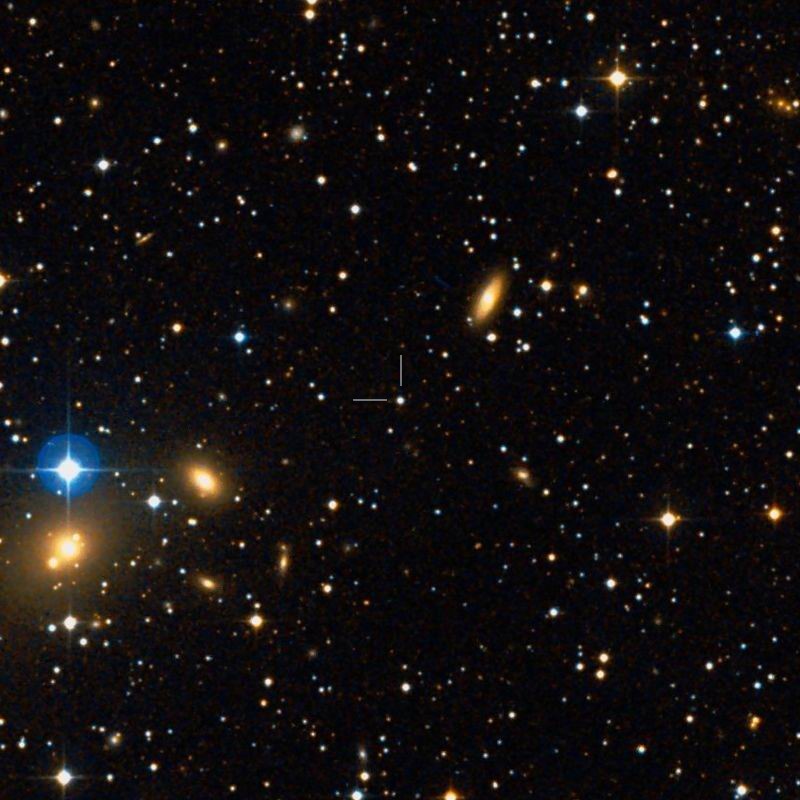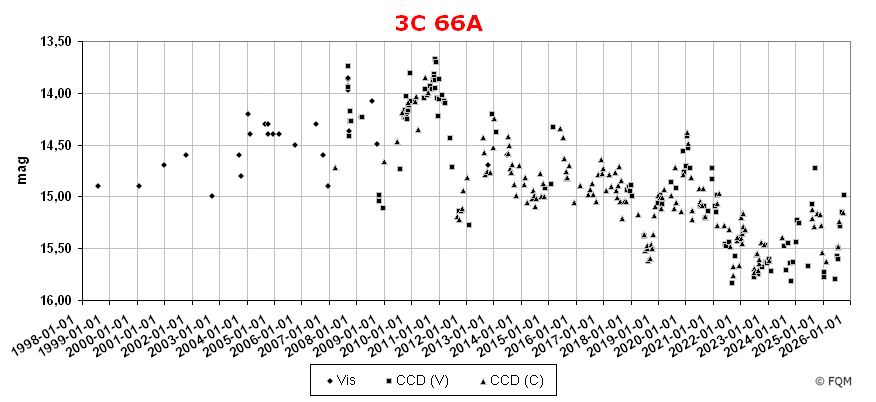
| Frankfurt Quasar Monitoring |
| 3C 66A |
| Cross-Identifications | B3 0219+428A, PKS 0219+428, MG4 J022237+4301 MW 0219+42, 87GB 021932.0+424811, 0219+428 1ES 0219+428, 2EG J0220+4228, GRO J0222+242 2E 0219.5+4248, 3EG J0222+4253, NRAO 102 QSO B0219+428, GB6 B0219+4248, LHE 055 |
| Equat. coordinates | RA 02 22 39.6 DE +43 02 08 (J2000) |
| Constellation | Andromeda |
| Type | BL Lac |
| Redshift |
z=0.444 |
| Distance (2) (3) | 1646 Mpc |
| Total mag range (mv) (4) | 12.81 - 16.56 |
| Catalog Magnitude (1) | 15.21 |
| Absolute Magnitude (1) | -26.5 MB |
| Light Travel-Time (2) | 4.472 × 109 yrs |

Comparison stars
| star | B | V | Rc | Ic |
| A | --- | 12.791 | 12.701 | 12.591 |
| B | --- | 13.601 | 13.381 | 13.061 |
| C | --- | 14.181 | 13.621 | 13.101 |
| D | 15.0883 | 14.3323 | 13.9073 | 13.5013 |
| F | --- | 14.771 | 14.281 | 13.731 |
| G | 15.8333 | 15.0763 | 14.6503 | 14.2263 |
| H | 16.2773 | 15.3093 | 14.7493 | 14.2673 |
| K | 16.282 | 15.752 | 15.312 | --- |
| L | 16.772 | 16.102 | 15.712 | --- |
| M | 17.782 | 16.902 | 16.102 | --- |
| N | 17.9803 | 17.2003 | 16.7783 | 16.3773 |
| P | 18.0283 | 17.2463 | 16.7893 | 16.3693 |


| 3C 66A is
a well-known BL Lac
object in
the eastern part of Andromeda, only 40´ north of edge-on galaxy NGC 891. The designation 3C 66A refers to the 3rd Cambridge Radio Catalog
(3C), where this object was discovered
as a
radio source in 1959. In
1966, the radio source 3C 66 was found to consist of two different
sources: 3C
66A,
a stellar object (later identified with the BL Lac object),
and 3C
66.0B, the
active radio galaxy UGC
1841
(z=0.0215), some 6´SW of 3C 66A
(see finding chart). In 1974, the radio source 3C 66A was identified with a 15-mag stellar object. Despite its (nearly) featureless spectrum a redshift of z=0.444 was determined. This corresponds to a cosmological distance of about 4.5×109 light-years. Since 1974, 3C 66A has been classified as a BL Lacertae-type object. Besides the optical and radio, blazar 3C 66A has been detected also as a source of both X-rays and gamma rays. As for most BL Lac objects, also 3C 66A shows fast and violent flux variations, ranging between 13 mag and 16 mag in the optical. On average, the brightness ranges between 14 mag and 15 mag (see light curve above). CCD observers, as well as visual observers, shall use the comparison stars given above. Other sequences were published by Smith et al. (1998) and the AAVSO. For visual observers, 3C 66A is one of the most interesting blazars in the night sky. A telescope of 8- to 10-inch of aperture and larger will show this blazar as a stellar object. At maximum brightness, even a 6-inch telescope will make 3C 66A visible in the eyepiece. ____________
Right next to 3C 66A there are 3 UGC galaxies, adorning this section in
the sky: UGC:1832
(NW), UGC:1837
(SE) and UGC:1841
(SE). This galaxy trio is part of galaxy cluster Abell 347,
located in
the cosmological foreground of 3C 66A. A
few arcseconds SE of UGC 1841,
the finding chart above also shows the 15-mag compact elliptical galaxy V Zw 230 = LEDA 212964.
Finally, do not forget about showpiece galaxy NGC 891 (40´S)
and the adjacent galaxy cluster Abell 347,
centered on NGC:910, SE
of 3C:66A. Another bright source of very old quasi-stellar photons, quasar RXS J00066+4342, is a bright 14-mag object at a distance of about 2×109 light-years, located 24.5° west of 3C 66A. |
| Arp, H. 1968, PASP, 80, 129; Lines of Galaxies from Radio Sources. Bowen, D., Osmer, S.J., et al. 1997, MNRAS, 284, 599; Redshifts of Galaxies close to Bright QSO Lines of Sight. Butcher, H.R., Oemler, A., et al. 1976, ApJ, 209, L 11; 3C 66 A: A BL Lacertae Object in a distant, rich Cluster of Galaxies. Corso, G.J., Ringwald, F., Schultz, J. 1988, PASP, 100, 70; Blue-Light Monitoring of 3C 273, 3C 351, 3C 454.3, 3C 66A, PKS 2141+17, OJ 287 and ZE 0039.5+04. Craine, E.R.; A Handbook of Quasistellar and BL Lacertae Objects; Parchart Publishing House, Tuscon 1977. Craine, E.R., Johnson, K., Tapia, S. 1975, PASP, 87, 123; UBVR Sequences and Observations of optically identified Radio Sources. Cruz-Gonzales, I., Huchra, J.P. 1984, AJ, 89, 441; Continuum Distributions of a X-ray observed Sample of BL Lac Objects. Fiorucci, M., Tosti, G. 1996, A&AS, 116, 403; VRI Photometry of Stars in the Fields of 12 BL Lacertae Objects. Gonzàlez-Pérez, J.N., Kidger, M.R., et al. 2001, AJ, 122, 2055; Optical and Near-Infrared Calibration of AGN Field Stars: An All-Sky Network of faint Stars calibrated on the Landolt System. Hansen, T. 1991, Deep Sky Magazine 34, 32; The "Deepest" Deep Sky Objects. Karge, S.; Helle Quasare für 8- bis 10-Zoll Teleskope. Ein Beobachtungsführer zur visuellen Beobachtung von Quasaren und BL Lacertae Objekten; Frankfurt 2005. Katajainen, S., Takalo, L.O., et al. 2000, A&AS, 143, 357; Tuorla Quasar Monitoring. I. Observations of 1995-1997. Kinman, T.D. 1976, ApJ, 205, 1; Photoelectric Magnitudes and Polarization Data for possible BL Lacertae Objects. Maccagni, D., Tarenghi, M. 1981, ApJ, 243, 42; X-Ray Observations of six BL Lacertae Fields. Miller, J.S., French, H.B., et al. 1978, in: Pittsburgh Conf. on BL Lac Objects, p.176, 1978. Northover, K.J.E. 1973, MNRAS, 165, 369; The Radio Galaxy 3C 66. Pica, A.J., Smith, A.G., et al. 1988, AJ, 96, 1215P; Long-term optical behavior of 144 compact extragalactic objects - 1969-1988. Sillanpää, A., Mikkola, S., et al. 1991, A&AS, 88, 225; Optical Monitoring of Quasars and BL Lacertae Objects. II. Smith, P.S., Balonek, T.J. 1998, PASP, 110, 1164; Photometric Calibration of Stars in the Fields of Selected BL Lacertae Objects and Quasars. Steinicke, W. 1998, Interstellarum 14, 24; Im Quasar-Fieber. Steinicke, W.; Katalog heller Quasare und BL Lacertae Objekte; Umkirch 1998. Steinicke, W.; Beobachtungsliste für helle Quasare; Umkirch 1999. Véron-Cetty, M.-P., Véron, P. 2001, A&A 374, 92; A Catalogue of Quasars and Active Nuclei: 10th edition. Véron-Cetty, M.-P., Véron, P. 2003, A&A 412, 399; A Catalogue of Quasars and Active Nuclei: 11th edition. Véron-Cetty, M.-P., Véron, P. 2006, A&A 455, 776; A Catalogue of Quasars and Active Nuclei: 12th edition. Véron-Cetty, M.-P., Véron, P. 2010, A&A 518, 10; A Catalogue of Quasars and Active Nuclei: 13th edition. Wenzel, K. 2001, Interstellarum 19, 54; 3C 66A, Ein BL-Lacertae Objekt im Hintergrund von Abell 347. Wenzel, K., Düskau, W. 2003, SuW 2/03, 60; BL-Lacertae-Objekte - Eine Herausforderung für den Amateur. Wills, B.J., Wills, D. 1974, ApJ, 190, L 97; 3C 66A: A bright new Quasi-Stellar Object. Wyndham, J. 1966, ApJ, 144, 459; Optical Identification of Radio Sources in the 3C Revised Catalogue. Xie, G.Z., Li, K.H., et al. 1990, A&A, 229, 329; Search for short Variability Time-scales of BL Lacertae Objects. Xie, G.Z., Li, K.H., et al. 1992, ApJS, 80, 683; CCD Photometry of 14 BL Lacertae Objects and theoretical Model. Xie, G.Z., Zhou, S.B., et al. 2002, MNRAS, 329, 689; Photometric Monitoring of 12 BL Lacertae Objects. Zwicky, F., Zwicky, M.A. 1971: Catalogue of selected compact galaxies and of post-eruptive galaxies. |
| Links: Landessternwarte Heidelberg (1) Landessternwarte Heidelberg (2) Hamburg Quasar Monitoring GASP Gary Poyner (light curve) |
| home |